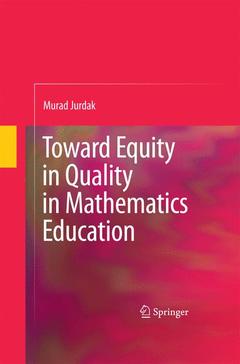Toward Equity in Quality in Mathematics Education, 2009
Auteur : Jurdak Murad

Educational equity and quality are not only research issues which cut across different disciplines but are major determinants of socio-economic and human development in both industrial and developing countries. The status and role of mathematics, a subject which has long enjoyed a privileged status in school curricula worldwide due to its perceived role in science and technology, render equity and quality in mathematics education at the heart of human development. This is reflected by governments? relatively large investments in improving the quality of mathematics education and extending it to marginalized and underprivileged groups.
The purpose of Toward Equity in Quality in Mathematics Education is four-fold. First, the book examines the constructs of equity and quality and their interdependence from different perspectives. Second, it develops a conceptual framework for studying and analyzing the two constructs. Third, it examines, consolidates, and re-structures the literature on equity and quality in mathematics education. Finally, using data from TIMSS 2003, the book investigates the within and across country impact of the different equity-related factors on mathematics achievement in a sample of countries representative of worldwide geographical and cultural regions.
Towards Equity in Quality in Mathematics Education uses a multi-dimensional conceptual framework to study and analyze issues in equity and quality. The framework consists of five perspectives hypothesized as determinants of equity in quality in mathematics education: Mathematical, societal, educational, ideological, and genetic. The framework can be thought of as a pyramid with mathematics as its base and the societal, educational, ideological, and genetic perspectives as its faces. Thus, each point within this pyramid represents a unique equity in quality situation i.e. with different coordinates with respect to mathematical, societal, educational, ideological, and genetic perspectives.
Towards Equity in Quality in Mathematics Education is useful for teachers and researchers in mathematics education.
After obtaining his PhD in mathematics education in 1973 from the University of Wisconsin-Madison, the Dr. Jurdak joined the American University of Beirut where he is currently a professor of mathematics education. He has published articles in leading international mathematics education journals and chapters in edited international books and has been a frequent contributor to international and regional mathematics education conferences. He has also been a consultant to Arab governments and international and regional foundations. His current research interests include problem solving in and outside school and equity and quality in mathematics education.
Provides a synthesis of current conceptual issues related to equity and quality in mathematics education
Discusses the link between equity and quality models in Education
Discusses equity and equality in mathematics education from different perspectives and in different contexts
Provides empirical support (or lack of it) to often made claims about equity and quality in mathematics education based on a credible international study
Provides an international perspective of equity and quality in mathematics education
Includes supplementary material: sn.pub/extras
Date de parution : 11-2014
Ouvrage de 177 p.
15.5x23.5 cm
Disponible chez l'éditeur (délai d'approvisionnement : 15 jours).
Prix indicatif 105,49 €
Ajouter au panier


